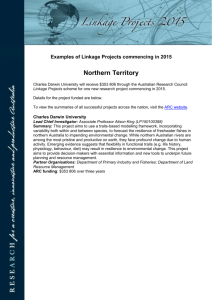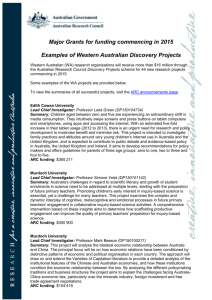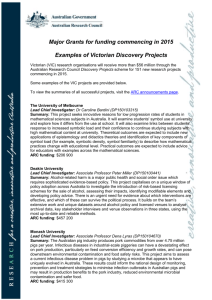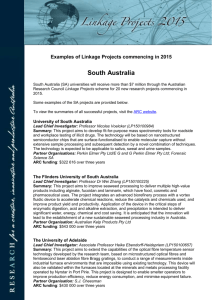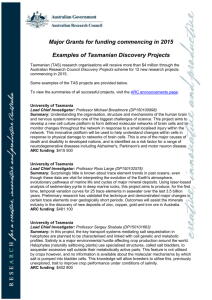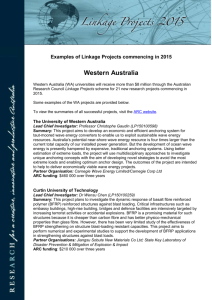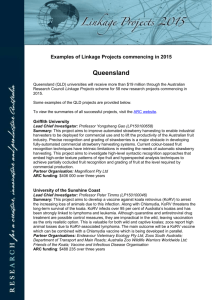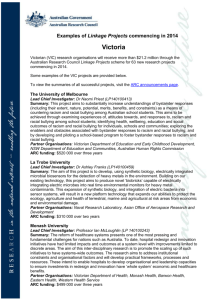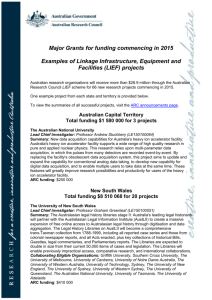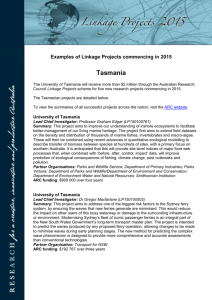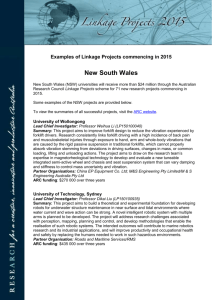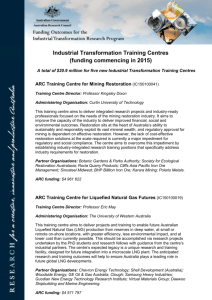Word Format - Australian Research Council
advertisement
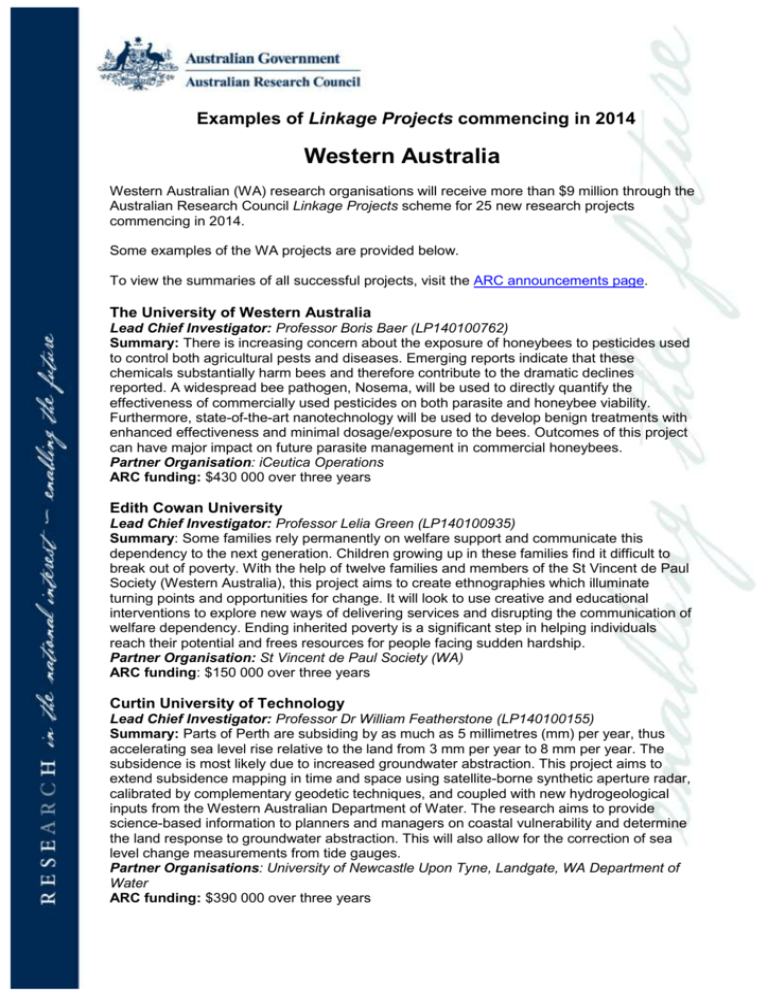
Examples of Linkage Projects commencing in 2014 Western Australia Western Australian (WA) research organisations will receive more than $9 million through the Australian Research Council Linkage Projects scheme for 25 new research projects commencing in 2014. Some examples of the WA projects are provided below. To view the summaries of all successful projects, visit the ARC announcements page. The University of Western Australia Lead Chief Investigator: Professor Boris Baer (LP140100762) Summary: There is increasing concern about the exposure of honeybees to pesticides used to control both agricultural pests and diseases. Emerging reports indicate that these chemicals substantially harm bees and therefore contribute to the dramatic declines reported. A widespread bee pathogen, Nosema, will be used to directly quantify the effectiveness of commercially used pesticides on both parasite and honeybee viability. Furthermore, state-of-the-art nanotechnology will be used to develop benign treatments with enhanced effectiveness and minimal dosage/exposure to the bees. Outcomes of this project can have major impact on future parasite management in commercial honeybees. Partner Organisation: iCeutica Operations ARC funding: $430 000 over three years Edith Cowan University Lead Chief Investigator: Professor Lelia Green (LP140100935) Summary: Some families rely permanently on welfare support and communicate this dependency to the next generation. Children growing up in these families find it difficult to break out of poverty. With the help of twelve families and members of the St Vincent de Paul Society (Western Australia), this project aims to create ethnographies which illuminate turning points and opportunities for change. It will look to use creative and educational interventions to explore new ways of delivering services and disrupting the communication of welfare dependency. Ending inherited poverty is a significant step in helping individuals reach their potential and frees resources for people facing sudden hardship. Partner Organisation: St Vincent de Paul Society (WA) ARC funding: $150 000 over three years Curtin University of Technology Lead Chief Investigator: Professor Dr William Featherstone (LP140100155) Summary: Parts of Perth are subsiding by as much as 5 millimetres (mm) per year, thus accelerating sea level rise relative to the land from 3 mm per year to 8 mm per year. The subsidence is most likely due to increased groundwater abstraction. This project aims to extend subsidence mapping in time and space using satellite-borne synthetic aperture radar, calibrated by complementary geodetic techniques, and coupled with new hydrogeological inputs from the Western Australian Department of Water. The research aims to provide science-based information to planners and managers on coastal vulnerability and determine the land response to groundwater abstraction. This will also allow for the correction of sea level change measurements from tide gauges. Partner Organisations: University of Newcastle Upon Tyne, Landgate, WA Department of Water ARC funding: $390 000 over three years Murdoch University Lead Chief Investigator: Professor Giles Hardy (LP140100690) Summary: The main industry on Christmas Island is mining of rock phosphate, but supplies will run out between 2025 and 2030. Consequently, there is an urgent and compelling need to develop other economic industries to support the resident island population by the time mining ceases. This project aims to utilise the project team’s extensive knowledge on legumes, nitrogen fixing bacteria and plant growth promoting bacteria to establish the basis for a viable agricultural industry on the Island. The project aims to provide: reliable and sustainable food sources for the local population; potential food export opportunities to southeast Asia; environmental benefits from the improvement of soils; and economic development of allied agricultural industries. Partner Organisations: Phosphate Resources Limited, Embrapa Soja ARC funding: $341 291 over three years The University of Western Australia Lead Chief Investigator: Professor Dr Jie Pan (LP140100987) Summary: This project aims to resolve an environmental noise issue caused by the humming noise of Kalgoorlie Consolidated Gold Mines haul trucks in the areas of Kalgoorlie, Boulder, and Williamstown. This solution utilises integrated passive and active control systems to attenuate the frequency components of humming noise from a truck’s exhaust and engine. A novel aspect of this technique is the use of passive micro-perforated structures to provide the necessary sound absorption capability and to alter the sound propagation and radiation properties of the truck exhaust and engine, and increase the effectiveness of active control. Partner Organisations: Kalgoorlie Consolidated Gold Mines, Virginia Polytechnic Institute and State University ARC funding: $250 000 over three years The University of Western Australia Lead Chief Investigator: Associate Professor Daniela Ciancio (LP140100375) Summary: Housing people in Australian remote communities is energy intensive. This is particularly true in hot regions, where the house running costs are significant due to airconditioning units functioning 24 hours a day, for most of the year. Rammed earth houses in dry-arid climate zones should not require any air-conditioning in summer. This project aims to investigate the optimal thermal performance of two occupied houses using a novel sensor network. It aims to deliver new evidence on the thermal performance of rammed earth buildings to inform energy-efficiency decision frameworks and enhance the wellbeing of Indigenous communities in hot regions. Partner Organisations: WA Department of Housing, Earth Dwellings Australia Pty Ltd ARC funding: $122 454 over two years
